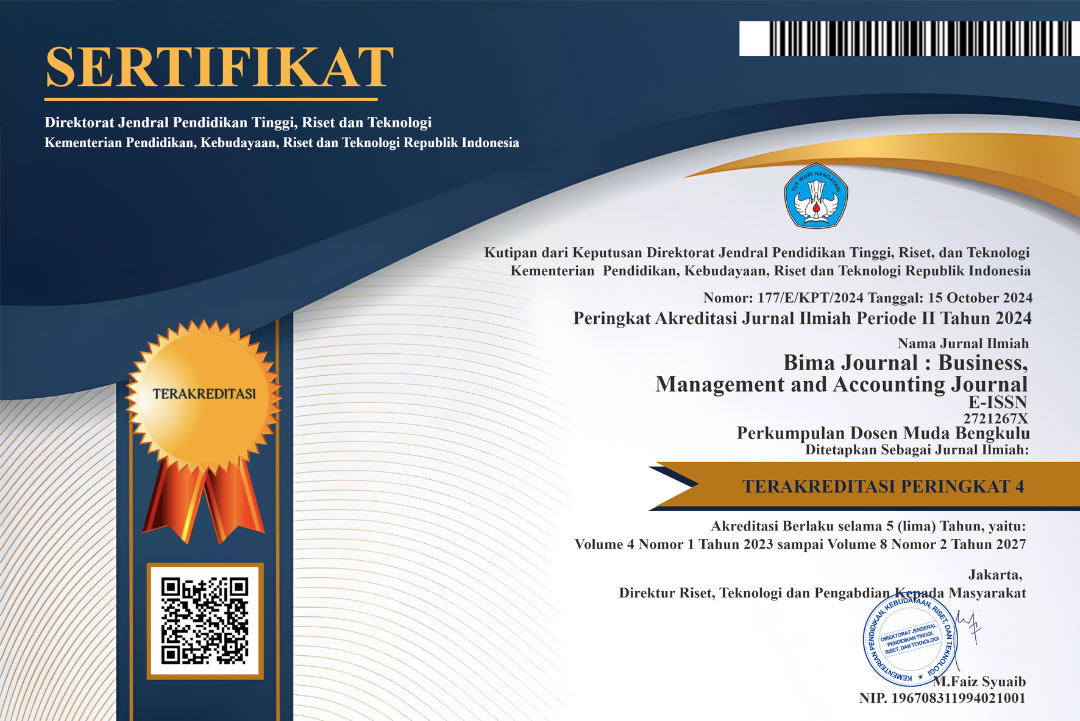Influence of Brand Image, Self-Congruence, and Brand Love on Brand Sacredness and Word-of-Mouth: Insights from Emina Skincare Users
DOI:
https://doi.org/10.37638/bima.5.2.229-236Keywords:
Brand image, Self Congruence, Brand Love, Brand Sacredness, Positive WOMAbstract
Purpose: This study examines the effects of brand image, self-congruence, and brand love on brand sacredness and word-of-mouth (WOM) among Emina Skincare users in Indonesia. Methodology: A quantitative survey approach was employed, collecting data through structured questionnaires from 150 respondents. Structural Equation Modeling (SEM) with WarpPLS 7.0 was used to analyze the relationships between variables. Results: The findings reveal that brand image and self-congruence significantly influence brand love, which enhances brand sacredness and WOM. Findings: The study highlights the importance of emotional drivers like brand love in fostering brand sacredness and encouraging positive WOM. Originality: This research contributes uniquely to understanding emotional attachment and brand advocacy in the local cosmetics market in Indonesia. Novelty: It addresses the gap in studying emotional branding and consumer behavior in emerging markets. Conclusions: Emina and similar brands should align their brand image with consumer identities, enhance emotional connections, and foster brand sacredness to encourage loyalty and positive WOM. Type of Paper: Survey-based quantitative research paper.
References
Angelina Widjaja. (2024). Pengaruh Brand Experience Dan Self Congruence Terhadap Brand Love, Brand Sacredness Dan Wtpp; Studi Kasus Pada Bts Meal. Universitas Kristen Petra.
https://perpus.petra.ac.id/catalog/digital/detail?id=52191
Ayuningsih, F., & Maftukhah, I. (2020). The Influence of Product Knowledge, Brand Image, and Brand Love on Purchase Decision through Word of Mouth. Management Analysis Journal, 9(4), 355–369. https://doi.org/10.15294/maj.v9i4.40796
Emina. (2022). Emina Bawa Pulang 2 Penghargaan MMA SMARTIES! Www.Eminacosmetics.Com. https://www.eminacosmetics.com/emina-bawa-2-penghargaan-mma-smarties-global-awards-2022
Giantari, I. G. A. K., Utama, I. P. H. B., & Wardani, N. L. D. A. (2020). Peran Brand Love Memediasi Pengaruh Brand Image Terhadap Word of Mouth. Juima: Jurnal Ilmu Managemen, 10(1), 54–61. http://e-journal.unmas.ac.id/index.php/juima/article/view/1072
Jang, E.-S., Jeong, G.-A., & Park, E.-J. (2023). The Impact of Hair Salon Brand Image on Self-Image Congruence and Brand Loyalty. Journal of the Korean Society of Cosmetology, 29(4), 972–982. https://doi.org/10.52660/jksc.2023.29.4.972
Joshi, R., & Garg, P. (2021). Role of brand experience in shaping brand love. In International Journal of Consumer Studies (Vol. 45, Issue 2). https://doi.org/10.1111/ijcs.12618
Joshi, R., & Garg, P. 2022. (2022). Assessing brand love, brand sacredness and brand fidelity towards halal brands. Journal of Islamic Marketing, 13(4), 807–823. https://doi.org/10.1108/JIMA-04-2020-0104
Shimul, A. S., & Phau, I. (2023). The role of brand self-congruence, brand love and brand attachment on brand advocacy: A serial mediation model. Marketing Intelligence & Planning. https://www.emerald.com/insight/content/doi/10.1108/mip-10-2022-0443/full/html
Torres, P., Augusto, M., & Neves, C. (2022). Value dimensions of gamification and their influence on brand loyalty and word-of-mouth: Relationships and combinations with satisfaction and brand love. Psychology and Marketing, 39(1), 59–75. https://doi.org/10.1002/mar.21573
Waluyo, W., Qurniawati, R. S., & Nurohman, Y. A. (2023). Generation Z’s Brand Love for Skincare Products: Do Religious Beliefs Matter? Shirkah: Journal of Economics and Business, 8(1), 95–108. https://doi.org/10.22515/shirkah.v8i1.615
Downloads
Additional Files
Published
Issue
Section
License
An author who publishes in the BIMA JOURNAL: Business, Management, and Accounting Journal agrees to the following terms:
Author retains the copyright and grants the journal the right of first publication of the work simultaneously licensed under the Creative Commons Attribution-ShareAlike 4.0 License that allows others to share the work with an acknowledgement of the work's authorship and initial publication in this journal
Submission of a manuscript implies that the submitted work has not been published before (except as part of a thesis or report, or abstract); that it is not under consideration for publication elsewhere; that its publication has been approved by all co-authors. If and when the manuscript is accepted for publication, the author(s) still hold the copyright and retain publishing rights without restrictions. For the new invention, authors are suggested to manage its patent before published. The license type is CC-BY-SA 4.0.
BIMA JOURNAL: Business, Management and Accounting is licensed under a Creative Commons Attribution-ShareAlike 4.0 International License.
You are free to:
Share — copy and redistribute the material in any medium or format
Adapt — remix, transform, and build upon the material
for any purpose, even commercially.
The licensor cannot revoke these freedoms as long as you follow the license terms.
Under the following terms:
Attribution — You must give appropriate credit, provide a link to the license, and indicate if changes were made. You may do so in any reasonable manner, but not in any way that suggests the licensor endorses you or your use.
ShareAlike — If you remix, transform, or build upon the material, you must distribute your contributions under the same license as the original.
- No additional restrictions — You may not apply legal terms or technological measures that legally restrict others from doing anything the license permits.
Notices:
- You do not have to comply with the license for elements of the material in the public domain or where your use is permitted by an applicable exception or limitation.
- No warranties are given. The license may not give you all of the permissions necessary for your intended use. For example, other rights such as publicity, privacy, or moral rights may limit how you use the material.





















